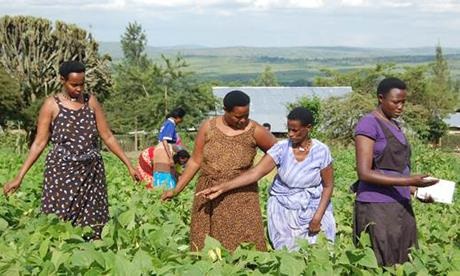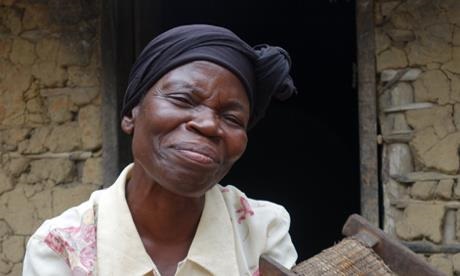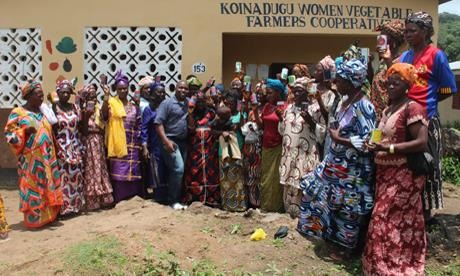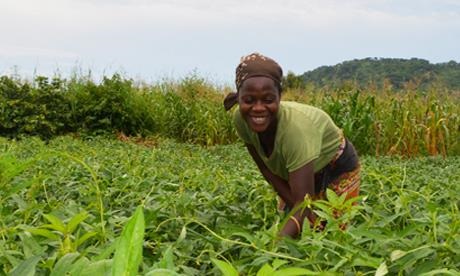Success stories
FAO's work on gender equality and women's empowerment at country level
New training module to improve food security and nutrition for upper Egypt’s women
02/08/2016
Community Nutrition Kitchens target women and youth for improved household food and nutrition security.

In Fiji: Helping market vendors get back on their feet
01/08/2016
Around 1 000 women market vendors – farmers who were adversely affected by Tropical Cyclone Winston – have received agriculture supplies that will help in their efforts to replant their crops. The produce will eventually be sold to market.

In Rwanda: Accelerating Progress towards the Economic Empowerment of Rural Women
07/06/2016
For women like Drocella, and for men like Emmanuel too, the Joint Programme on “Accelerating Progress towards the Economic Empowerment of Rural Women” is making a difference.

School gardening in Samoa: sowing seeds for youth employment in agriculture
02/05/2016
Students from St Mary’s College in Apia, Samoa can finally begin their school garden project.

Helping men and women fisherfolk in the Philippines to build back—and better
25/04/2016
The loss of livelihoods resulting from Typhoon Haiyan had far-reaching effects on the overall quality of life of Filipino fishers, particularly for women, who play an important role in the post-harvest processing of fish.

Women fish processors and the ripple effect: how a little knowledge can go a long way
11/04/2016
In 2013, the Food and Agriculture Organization of the United Nations (FAO) and the Government of Angola embarked on a technical cooperation project to address post-harvest fishery losses in five fishing communities around Lake Ngolome, in Angola’s northwe

FAO Regional Conference boosts Africa Solidarity Trust Fund
08/04/2016
Calls for renewed vision and expanded Africa-for-Africa cooperation and South-South Cooperation

FAO supports entrepreneurship amongst rural youth in Honduras
05/04/2016
“We have received training in gender, which is very important because we help each other and exchange ideas with our female colleagues in the group. We have been given all the material so that we can perform at business and community level,” explains one

Africa Solidarity Trust Fund changing lives through village banks
22/03/2016
Fanny Jackson, 29, a member of Tiwale VSL Group talks about the link between household economic independence and climate shocks in Phalombe district, one of 15 districts declared a disaster area by President Peter Mutharika in early 2015.

Listening for change: Dimitra updates from the Niger and the Democratic Republic of the Congo
08/03/2016
Across hundreds of rural communities in sub-Saharan Africa, the Dimitra project is making a difference in the lives of rural women and men. This week, in honor of International Women's Day, we spotlight two such communities.

Empowering Ugandan students through school farm camps
12/11/2015
FAO and the Gayaza High School in Uganda are working together to develop opportunities for students to learn and acquire agricultural skills while eating healthier and nutritious food.

Women farmer groups on the road to recovery in Sierra Leone
07/10/2015
Rebuilding productive assets affected by the Ebola outbreak.

Helping women farmers resume food production after the Nepal earthquakes
04/10/2015
Mira Upreti kneels on the dirt floor in her hut, cooking food on a makeshift fireplace. The corrugated iron roof and walls, and the fire, make the air inside hot and smoky. At night, mosquitos come in through the chicken wire covering the open windows.

Women’s Dietary Diversity Score: Tajikistan embraces a new way to fight child malnutrition
22/04/2015
Tajikistan is a country with a young population. Seven out of ten of its people are under the age of 30, and the country views this young and growing generation as an important asset to invest in for the future. In recent years, they have achieved signi

Achieving food and nutrition security in remote areas of the Chittagong Hill Tracts
11/02/2015
Rural men and women in remote areas of the Chittagong Hill Tracts are now more positive about their future and their ability to resist future shocks to their agriculture-based livelihoods.

Milk for health and wealth - supporting small dairy producer communities in Lebanon
28/01/2015
The introduction of modern equipment and cooling centres is benefiting over 3,000 farmers, especially women, and has increased their production capacity by some 50 percent.

Malawi farmers find relief from FAO project after severe floods
27/01/2015
Smallholder farmers in the flood-prone districts of Phalombe, Mangochi and Nsanje in Malawi are now optimistic to stand on their feet following prospects of good harvest after severe floods washed away their fields last year.

Rwanda and FAO support business opportunities for young women and men
18/11/2014
The new ASTF funded project is going to focus on the next mostly affected malnutrition districts in Rwanda, which are Bugesera, Gisagara, Gakenke and Ruhango.

Conservation Agriculture in Lesotho: when mother knows best
10/06/2014
'Me Maphoka Thaba is a rural farmer in the village of Ha Khojane, Mahobong, in the district of Leribe, in northern Lesotho. Still active and energetic at 72, she has faced many problems that are all too common to rural farmers in Lesotho.

Women of Kanem taking the lead in agricultural development
03/06/2014
In the western Chad region of Kanem, the majority of men from poor rural families have migrated to areas with better economic opportunities to ensure the survival of their families. Women are often left as head of household and assume particularly heavy t
